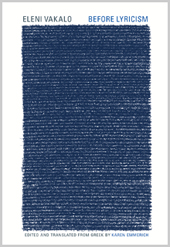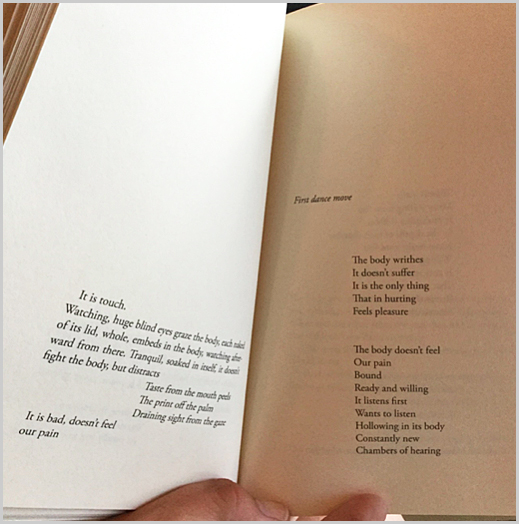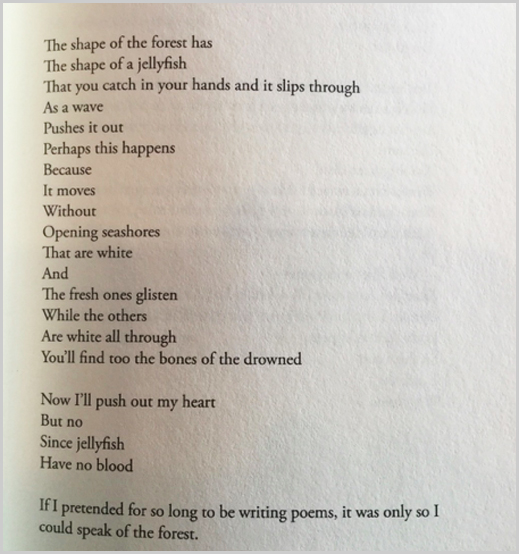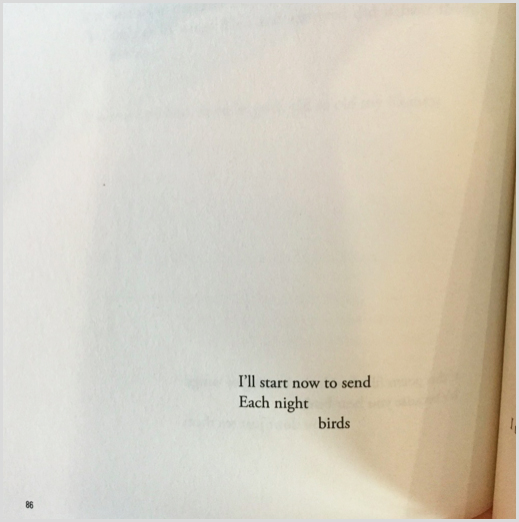Celia recommends Seiobo There Below by László Krasznahorkai:
 It’s difficult to find a quotable sentence from László Krasznahorkai’s Seiobo There Below. Which is a shame, because I would like to open this review not as a review, but simply by throwing you, the reader, into the deep end of this book. To read it is a lot like swimming, actually—you hold your breath. You ask yourself if you can get to the end of the next sentence without coming up for air. And they are long sentences, baroque and difficult and careening, propulsive sentences that you feel against your eyes like pressure deep underwater. Eventually you find a rhythm, like an underwater swimmer.
It’s difficult to find a quotable sentence from László Krasznahorkai’s Seiobo There Below. Which is a shame, because I would like to open this review not as a review, but simply by throwing you, the reader, into the deep end of this book. To read it is a lot like swimming, actually—you hold your breath. You ask yourself if you can get to the end of the next sentence without coming up for air. And they are long sentences, baroque and difficult and careening, propulsive sentences that you feel against your eyes like pressure deep underwater. Eventually you find a rhythm, like an underwater swimmer.
Or, if you don’t like that metaphor, here is another, from László Krasznahorkai himself: “who could believe it, that it would be possible to come down from there, from the bridge over the creek to the city—completely freely, without breaking—impossible, he would say, the path is so steep, there are so many turns, and the bicycle would accelerate so much, that in seconds the whole thing would be a labyrinth of speed.” Far from ending there, that sentence goes on for several more pages, like the headlong bicycle rushing down the hill, without brakes, about to overturn at every moment, and yet never overturning. A labyrinth of speed!
At first glance, you might call Seiobo There Below a book of short stories, but in truth it’s a novel. What binds the chapters together is not a shared plot or characters, but a tightly cohesive set of concerns about art and its power to cause awe, passion, terror, hope and despair. The chapters move fluidly through space and time—a Noh actor momentarily embodies the goddess of beauty, a destitute immigrant in Spain finds himself confronted by a pair of too-real angels in a medieval painting, a tourist in Greece tries to visit the Acropolis, a Renaissance artist suffers from uncontrollable rages. Each chapter visits and re-visions the possibility of salvation and destruction through beauty. The unruliness of the text itself, the way it demands your full attention, making no concessions to ease of reading, makes it at once immersive and unapproachable, a book that you have to read with your entire body—like swimming, like riding a bicycle—as much as your eyes. In the second chapter, there is an untranslated crossword in Italian, whose clue for number 54 across includes the name of the ancient queen whom the following chapter is about.
When I gave the book to a friend, she got to this chapter and then texted me and said, “Did I mistakenly tell you that I wanted to read 500 pages by a Hungarian madman?” Then she read the rest of it, found the translator, and interviewed her for the Paris Review. It’s a novel that works that kind of alchemy—disbelief, then fascination. One thinks, at first, that it is a merciless book, but then there are moments of close attention that become a kind of compassion. Take, for instance, a Buddhist monk watching an ant cross a temple step: “lifting up its little ball of head… it stops, turns around, and just as sprightly as it can, goes again backward in the crack, and all the while the early spring sun shines on it, at times a draft of the wind strikes it, you can see the ant struggling not to be carried off by the wind, little ant, says the abbot, shaking his head, little ant in the deep crack of the step, forever.”
Or take this sentence: “Because not to know something is a complicated process, the story of which takes place beneath the shadow of the truth.”

 Stephanie recommends
Stephanie recommends  Turns of phrase as in lyrical expressions, yes. Also turns of phrase as in a series of words folding in on itself before expanding into additional meanings. And also turns of phrase as in a dance, the phrase a unit composed of bodily gestures, the dancer moving, turning. The poems in this book first and foremost are “about” no first and foremost, the text being concerned with the sort of ambiguity generated by turns of phrase.
Turns of phrase as in lyrical expressions, yes. Also turns of phrase as in a series of words folding in on itself before expanding into additional meanings. And also turns of phrase as in a dance, the phrase a unit composed of bodily gestures, the dancer moving, turning. The poems in this book first and foremost are “about” no first and foremost, the text being concerned with the sort of ambiguity generated by turns of phrase. The poems in Before Lyricism—the first Vakalo book in English translation, courtesy a decade of dedication from Emmerich, recently awarded the Best Translated Book Award of 2018 for the work—are interested in composition (of art, of a body, of meaning, of image, of ourselves) as expressed through language/image/movement. Vakalo, a Greek art critic and art historian who lived from 1921 to 2001, writes in wild lines—wild in the sense that they seem to express freedom of movement, with no poem in the book adhering to a single visual form throughout its pages.
The poems in Before Lyricism—the first Vakalo book in English translation, courtesy a decade of dedication from Emmerich, recently awarded the Best Translated Book Award of 2018 for the work—are interested in composition (of art, of a body, of meaning, of image, of ourselves) as expressed through language/image/movement. Vakalo, a Greek art critic and art historian who lived from 1921 to 2001, writes in wild lines—wild in the sense that they seem to express freedom of movement, with no poem in the book adhering to a single visual form throughout its pages.
 So, these stories are weird. But none of the people in them think they’re weird. A witch dies and comes back in the form of a cat to help guide her son into claiming her vengeance. An aimless youth lives and works at the roadside convenience store serving strange drifters and zombies that wander in late. A medium reflects on the many differences between ghosts and people as she assists a living man through the process of getting a divorce from his dead wife, who is still there with him. Nothing is out of the ordinary here, in these worlds, for these characters. To them, this is just normal. Just work. Just life.
So, these stories are weird. But none of the people in them think they’re weird. A witch dies and comes back in the form of a cat to help guide her son into claiming her vengeance. An aimless youth lives and works at the roadside convenience store serving strange drifters and zombies that wander in late. A medium reflects on the many differences between ghosts and people as she assists a living man through the process of getting a divorce from his dead wife, who is still there with him. Nothing is out of the ordinary here, in these worlds, for these characters. To them, this is just normal. Just work. Just life.